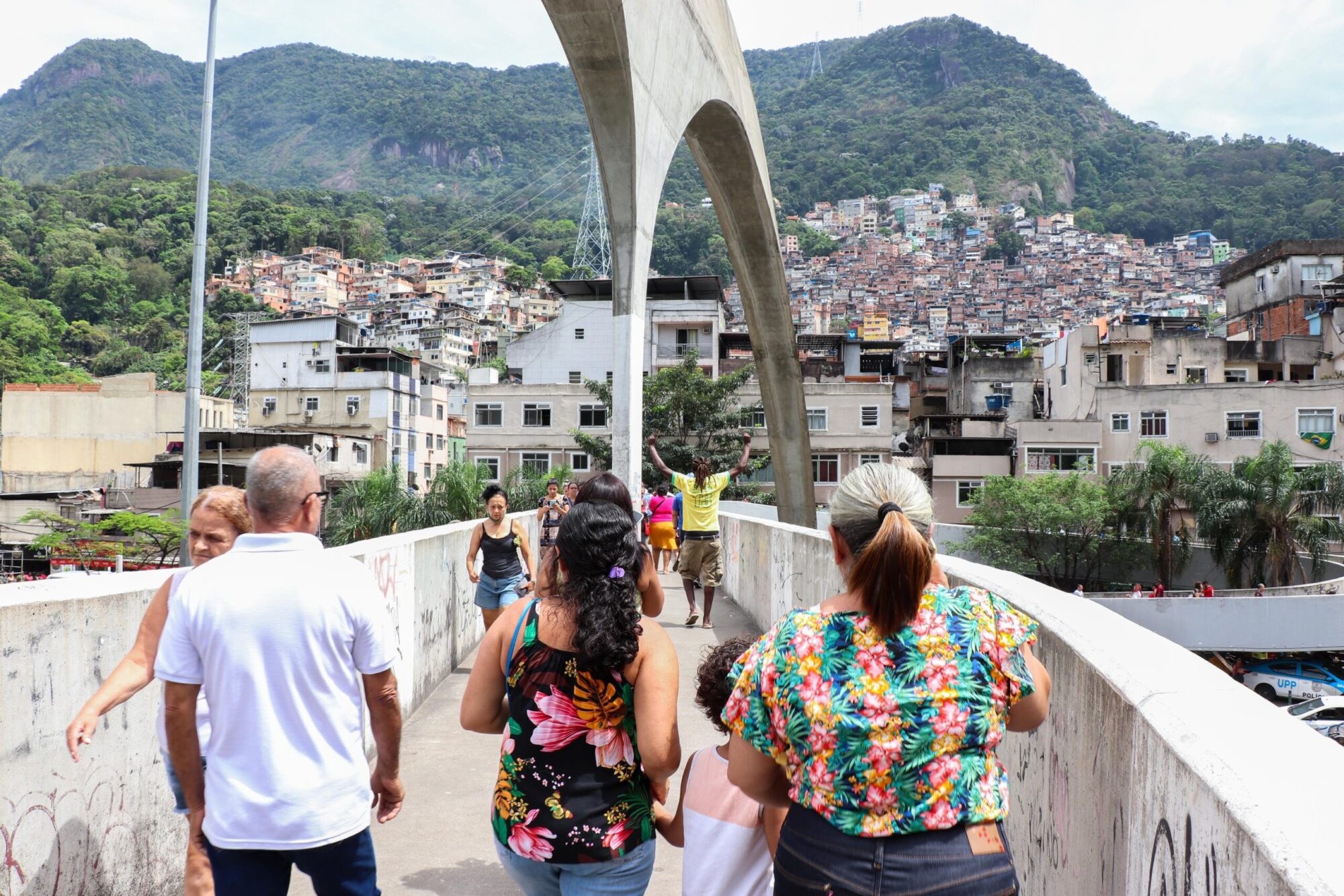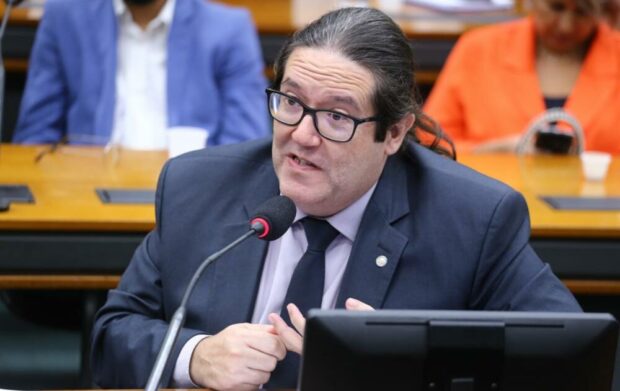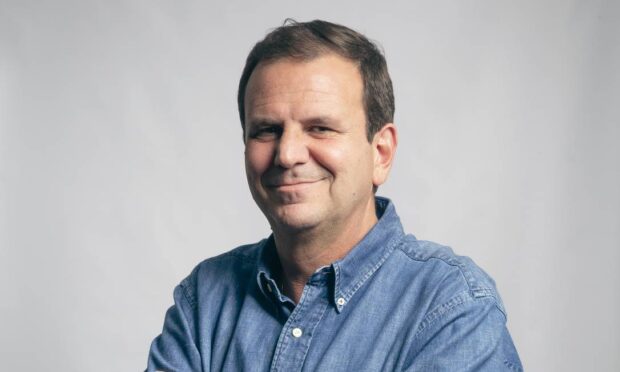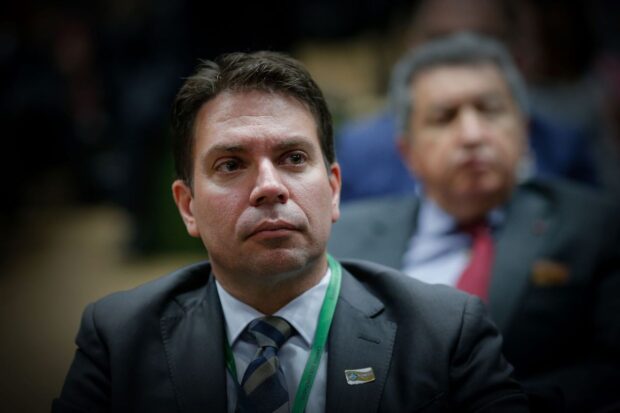
Clique aqui para Português
“All favelas, with every election, hold on to hope for changes within their communities… The favelas can and should expect public policies from the municipal government.”
This is how Ronaldo Rozendo, who holds a master’s degree in geography and is a resident of Morro do Cruz in Tijuca, in the North Zone of Rio de Janeiro, and the coordinator of the Favela Viva project, views the electoral period. According to him, it’s always the same: a true politics of fatigue. Various community media outlets report on what the favela wants and needs. But what about the mayoral candidates—what do they think about the favelas?
RioOnWatch analyzed the statements and governance proposals of the three leading mayoral candidates according to opinion polls, sharing their plans below in order of those who presented the most proposals for favelas. In a city with 1,074 favelas and a favela population of at least 1.4 million—accounting for a minimum of 22% of the capital’s total inhabitants, according to data from the Instituto Pereira Passos (IPP), the city’s urban planning and research institute—understanding what these candidates think about the favelas is crucial.
Tarcísio Motta (50)

Tarcísio Motta (PSOL) is the candidate with the most proposals regarding favelas. One of the primary actions in his government plan is the creation of the Rio Housing program, aimed at “combating real estate speculation, reducing the city’s housing deficit, and providing adequate housing for people experiencing homelessness.” He plans to implement a favela upgrading policy through the Favela is City program. “We will invest in environmental sanitation projects in favelas to guarantee clean water and sewerage in these communities, while also providing job opportunities to local residents where these projects are carried out,” the document states.
The candidate also plans to “strengthen the Family Health Strategy in neighborhoods and expand the network of Community Health Agents in favelas.” Regarding health, Motta seeks to eliminate tuberculosis in the city, starting with Rocinha, which has the highest concentration of cases. In the field of technology, he proposes to create the Rio Digital program, with a goal to implement a free 5G wireless Internet system across the city by 2028. For social assistance and housing, he intends to “integrate the work of social assistance professionals with the city’s housing policies, particularly the services provided in favelas by the Urbanistic and Social Orientation Posts (POUSO).” The candidate also plans to invest in environmental sanitation projects, beginning in the favelas.
In the area of employment and income, Motta’s government plan includes “encouraging and providing conditions for the productive organization of women in socially vulnerable situations within their communities.” Regarding public safety in favelas, the candidate plans to “reject the policy of military occupation and management of favelas and working-class neighborhoods by the State government.” When it comes to infrastructure, the government plan outlines “restoring streets, sidewalks, squares, and parks and to improve public lighting, remove fences, and enhance accessibility,” as well as “promoting cultural activities in squares and parks.”
Through sustainability initiatives, Motta aims to create a “Municipal Program of Sustainable Innovation Points” to distribute grants and awards to small, existing sustainability projects in the city’s favelas and peripheral areas. For socio-environmental disasters, his government plan proposes developing a Hydrological Risk Mapping System and expanding the city’s Geological Risk Mapping System. In terms of management, he plans to strengthen the Municipal Sanitation Fund, allocating a specific budget for investments in favelas, extend the social tariff for water supply services, and implement a social tariff for sanitation services.
Regarding solid waste, if elected, Motta plans to establish specific programs for recycling and waste collection in favelas. He aims to decentralize public investment, focusing on both direct and indirect support. Additionally, he intends to ensure that cultural promotion policies include specific initiatives that support artistic expressions and traditional cultural manifestations, particularly in the favelas and peripheral areas of the city.
In the audiovisual sector, Motta proposes to “strengthen RioFilme, City Hall’s audiovisual production and distribution company, to support the training of new creators, especially from favelas and peripheral areas.” For animal protectors, he plans to implement “social, economic, and educational assistance projects for those in vulnerable situations, particularly in favelas and areas near environmental conservation units.”
Eduardo Paes (55)

Currently, the city of Rio is under the administration of Eduardo Paes (PSD), who is serving his third term and continues to lead the polls, with 57% of voting intentions pointing to a likely fourth term.
According to Paes’ government proposals filed on the Superior Electoral Court (TSE) website, favelas are among the mayor’s eight central objectives. If re-elected, he plans to “continue increasing social and infrastructure investments, especially in the neighborhoods of the North and West Zones, as well as in the communities and favelas of Rio, always aiming to improve the quality of public services, rehabilitate existing infrastructure, and create job opportunities to generate employment and income for our most economically vulnerable population.”
According to the document, the candidate aims to “expand the coverage of the Morar Carioca and Bairro Maravilha programs throughout the city; promote housing improvements in 20,000 homes of families identified as socially vulnerable through the Casa Carioca program; and create the HUB Entrepreneurial Favela program to support entrepreneurs in the city’s favelas and communities.” Paes also expresses the desire to expand the Professional Training Program focused on female entrepreneurship in communities and neighborhoods with high levels of economic vulnerability.
Alexandre Ramagem (22)

Alexandre Ramagem (PL), on the other hand, does not mention the word “favela” in his government plan. He states that “our communities need priority attention. Thousands of families, hardworking men and women, and our youth live in them.” According to his government proposals, he intends to create the Carioca Housing and Communities Program, which “focuses on the necessary land tenure, urban improvement, and strengthening of social programs within the communities.”
Regarding public safety, the candidate states that “it is essential for the city government to be engaged in public safety not only through a physical presence but also through violence prevention programs, support for vulnerable communities, and promotion of citizen participation.” In the field of education, he proposes the Let’s Learn full-time education program: “We will offer school days of at least seven hours for all students in the public school system and full-time school days of ten hours in the most vulnerable communities. We will also provide psychologists and social workers as part of the staff in municipal public schools.”
When it comes to sports, the government plan includes the creation of the Sports Straight Up program, which will be “implemented in vulnerable areas and focused on improving infrastructure, enhancing human resources in Olympic villages, and creating sports spaces in communities.” In the cultural sector, if elected, Ramagem plans to establish the Carioca Culture program, which will provide training for professionals from communities to work with samba schools and other continuous training programs for artists, technicians, and cultural managers, enabling constant skill development and employability in the sector.”
What the Favelas Hope to See From a New Mayor
Jovino Neto is a missionary with the organization Youth with a Mission, which has been present in Borel for over 25 years. He says that the new government needs to address issues such as sanitation, housing, and road expansion.
“In Borel, we only have one road going uphill. You can’t go down through Grota or Rua Nova [areas within the favela]. There was a project in 2014 for compensating homeowners and expanding the road, but it didn’t move forward.”
He also states that certain actions are necessary in the favelas, starting with the youth:
“There hasn’t been any program aimed at youth for professional training or raising their expectations about the future. If one comes, it would be very welcome.”
Regarding what the favelas can expect from an elected municipal government, Neto says that real dialogue between public authorities and the favelas is the best path. “A dialogue council could be created with the presidents of associations and the sub-mayors. Each region could present its demands, which range from early childhood education, sanitation, health, security, and the environment, to employment and income.”
Ronaldo Rozendo, from Morro do Cruz, agrees with Neto and says that basic services are essential actions in the favelas. “Among the challenges are issues of infrastructure, health, education, security, community participation, land tenure, employment and income, culture and leisure, and housing policies. These are the main topics that the mayor needs to address with the favela.”
The interviewees echo the issue of housing in favelas. “As a resident of the community, I see the lack of infrastructure as one of the most pressing issues affecting working-class communities, peripheries, and favelas. There’s a lack of both infrastructure and security in housing,” he adds. The community leader also points out the absence of cultural and leisure facilities, a result of State neglect. “It seems they don’t give this topic the attention it deserves in our communities, and it’s greatly missed,” he concludes.
About the author: Igor Soares was born and raised in Morro do Borel and has a journalism degree from the Federal University of Rio de Janeiro (UFRJ). He currently contributes to #Colabora and works as a freelancer. He has experience covering topics related to cities, human rights, and public security, having previously worked at Estadão, Portal iG, and produced reports for Folha de São Paulo.
